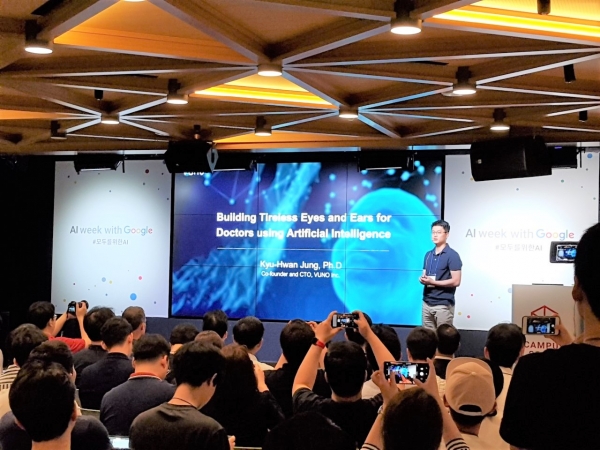
I am Jung Kyu-hwan, CTO of VUNO, a start-up company which develops AI-based medical diagnosis assistant solutions. After giving a lecture on the topic ‘entrepreneurship’, I was asked by The Postech Times to provide an article on my experience of organizing and developing a startup, so I would like to inform Postechians about what I do and share my thoughts on technology-based startups through this article.
At VUNO, we are using one of the most noted technologies, the machine learning method – ‘deep learning’, to analyze various medical data, ranging from medical images to biological signals. Based on this data, we develop and commercialize assistant solution systems that help doctors diagnose and classify diseases. Therefore, we work closely with a variety of medical staff as well as machine learning researchers. Since we are marketing products related to the field ‘Medicine’ – a sector closely guided by regulations, we also work closely with government departments, such as the ‘Ministry of Food and Drug Safety (MFDS)’ and the ‘Health Insurance Review & Assessment Service (HIRA)’. As a CTO, I lead the overall research development of the company, partaking several research projects and supporting researchers, so that they can achieve the best results in the best environment. Furthermore, since it is my job to represent the company technologically, I participate in various external lectures, academic activities, and public relations activities.
I am one of the three founders of VUNO, and we used to be researchers at the Samsung Advanced Institute of Technology (SAIT). At POSTECH, in the Department of Industrial Management Engineering, I majored in nonlinear optimization and data mining and received a degree for improving the scalability of machine learning algorithms. After graduation, I joined the SK Telecom Platform Technology Institute– a company that produces services based on Big Data –to develop technology related to mobile content services; this was when I witnessed the paradigm change to mobile. Predicting that the to-mobile revolution would solve the information imbalance and improve many technical inefficiencies, I planned to launch a start-up, but gave up because I failed to build a desirable team. Although there were a few more opportunities to join other start-ups, I could not due to practical problems. In order to continue my career as a researcher, I transferred to SAIT, one of the leading research companies in Korea. At SAIT, I worked on the development of deep-learning-based speech recognition technology and realized the potential of ‘deep learning’. I thought that if the to-mobile revolution improved accessibility to information, then AI based on deep-learning will change the accumulating data into something much more valuable. Right at that time, my excellent colleagues who were preparing to launch a start-up offered me to join them, so I left the company to join the forefront of entrepreneurship.
In the beginning, since we had launched a start-up without an actual business model but with technology only, we had to study and produce everything from the beginning. Whilst the process of producing something from nothing was fun as it was contrary to the equipped environment provided by major companies, the uncertainty of being in a situation with no correct answer was always an element of insecurity. Especially, after focusing our field of business to medicine, since we had limited knowledge on medicine, we had immense amounts to study, ranging from medical terminology to medical systems. When I had to give lectures to or attend research conferences with doctors, I was sleepless for nights; I was so afraid that I would make a mistake in front of medical professionals. Fortunately, after AlphaGo became famous and after our early research on lung diseases became known, the understanding and acceptance of AI from medical personnel increased, and VUNO was able to quickly expand into various fields of Medicine. VUNO grew rapidly as intellectual researchers and programmers enlisted, and now we have a team of 60, including not only clinical trial experts for MFDS and FDA licensing, but also a business team for domestic and international commercialization and three doctors, including a medical specialist. Currently, our biggest challenge is efficiently inducing VUNO’s technology and product into medical environments, and we are also contemplating on how to maintain the communication and teamwork that will become increasingly difficult to handle as the company grows.
The advice I would like to give to those who aim to start technology-based start-ups is that it takes longer than one thinks for a technology to become a product used in the real world. In order to withstand this long span of time, one must have the technology that matches the market trend, so that the company can receive investments for business growth. Furthermore, one must always be ready to adapt to new environments and changes. However, most importantly, one must have a team he can trust and rely on. If one has the right team and capacity, I strongly encourage my POSTECH juniors to launch start-ups. As someone who launched a start-up a bit premature, I would like to tell my fellow Postechians that launching a start-up is one of the best ways for someone who studies science and technology to practicalize technology, whilst serving the nation and society too.


